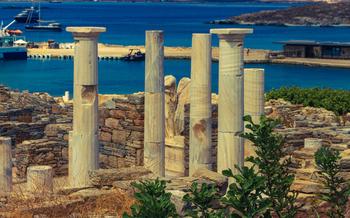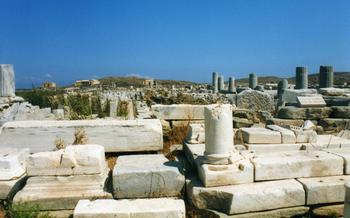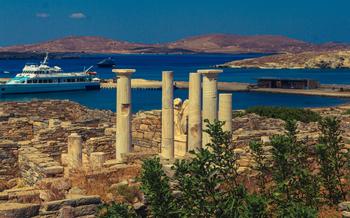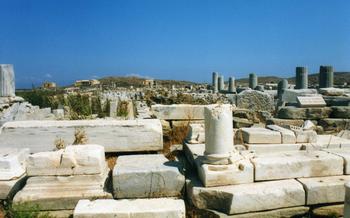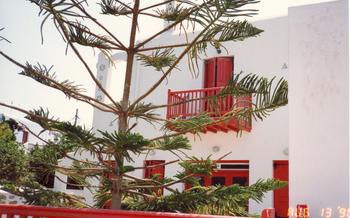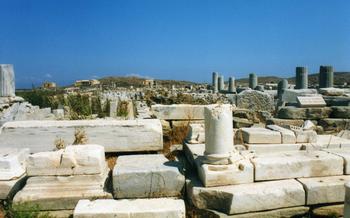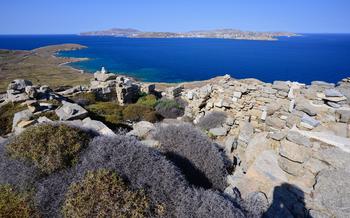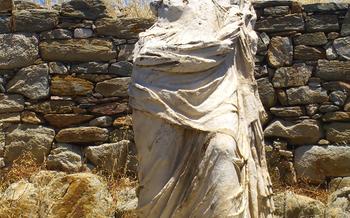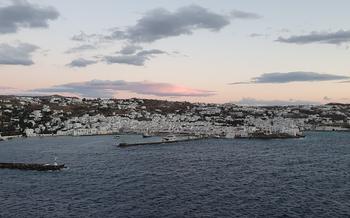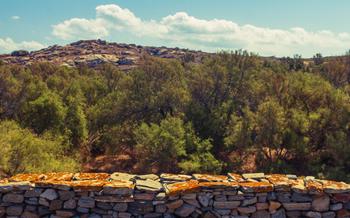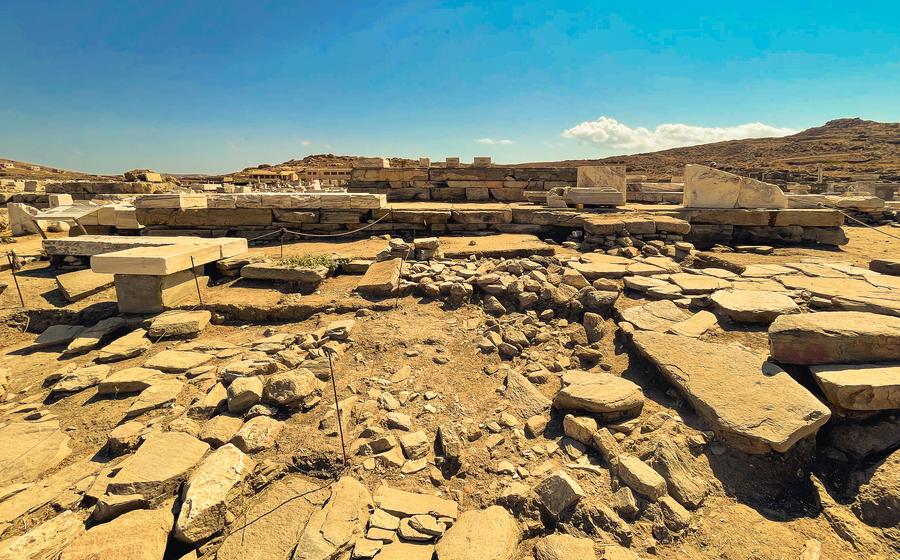
Delos Island Archaeological Site
- Delos Island: A Journey Through Myth and History
- Transportation to Delos: Embarking on an Island Adventure
- Delos Island Tour: Exploring the Archaeological Ruins
- The Temple of Apollo: A Majestic Symbol of Ancient Worship
- Terrace of the Lions: Guardians of the Sacred Isle
- Ancient Market: Delos' Thriving Commercial Hub
- House of Dionysus: Unveiling the Secrets of a Wealthy Delos Household
- Ancient Theater: Echoes of Performances Past
- Mount Kynthos: A Sacred Peak with Panoramic Views
- Lunch Break: Savoring Authentic Greek Cuisine
- Photography Tips: Capturing the Essence of Delos
- Souvenirs: Mementos of a Delos Adventure
- Planning Your Visit: Essential Tips for a Smooth Experience
- Insider Tip: Unveiling Hidden Gems
Delos Island: A Journey Through Myth and History
Delos, a small island in the Aegean Sea, holds a significant place in Greek mythology and history. According to legend, it was the birthplace of the twin gods Apollo and Artemis, children of Zeus and Leto. The island was considered sacred in ancient times, and its religious importance is reflected in the numerous temples and sanctuaries that were built here. Delos also served as a major commercial center, with a thriving port that facilitated trade throughout the Mediterranean. In the 2nd century BC, the island was declared a free port by the Romans, further boosting its commercial significance. Archaeological excavations conducted on Delos have revealed a wealth of ancient ruins, including temples, theaters, markets, and private residences. These discoveries have provided valuable insights into the island's rich history and culture, leading to its designation as a UNESCO World Heritage Site in 1990.
Transportation to Delos: Embarking on an Island Adventure
To reach the ancient island of Delos from the vibrant shores of Mykonos, an array of ferries stands ready to whisk you away on an adventure through time. Multiple departures from both Mykonos Town and the sun-kissed shores of Platis Gialos Beach ensure seamless connections to this archaeological wonderland.
Ferries depart regularly throughout the day, providing a convenient and affordable mode of transport. Ticket prices vary depending on the time of year and the ferry company, but typically range from 15 to 25 euros for a round-trip journey. To avoid disappointment during peak season, advance booking is highly recommended. Online platforms and local travel agencies offer a convenient means of securing your spot on the ferry, ensuring a hassle-free start to your Delos exploration.
Once aboard the ferry, you'll have the opportunity to soak in the breathtaking views of the Aegean Sea, with the silhouette of Delos gradually emerging on the horizon. The journey takes approximately 45 minutes, providing ample time to relax, enjoy the salty breeze, and prepare yourself for the wonders that await on this ancient isle.
Delos Island Tour: Exploring the Archaeological Ruins
A visit to Delos Island offers a unique opportunity to step back in time and explore the remnants of a once-thriving ancient civilization. Whether you choose to embark on a guided tour or wander through the ruins at your own pace, there are countless treasures to discover.
Guided tours are highly recommended for those who want to delve deeper into the site's history and significance. Knowledgeable guides will lead you through the archaeological highlights, providing insights into the lives and beliefs of the ancient Delians.
For a more intimate experience, self-guided exploration is also an excellent option. Maps and guidebooks are available to help you navigate the site and understand the significance of each ruin. Must-see landmarks include the Temple of Apollo, the Terrace of the Lions, and the Ancient Market.
The Temple of Apollo, with its impressive Doric columns and exquisite sculptures, stands as a testament to the island's religious importance. The Terrace of the Lions, featuring a row of majestic marble lions, offers a glimpse into the island's connection to the mythical world. And the Ancient Market, with its well-preserved shops and warehouses, provides a fascinating insight into the bustling commercial activities that once took place on Delos.
As you wander through the ruins, let your imagination run wild as you picture the ancient Greeks going about their daily lives. Delos was a thriving metropolis, a crossroads of cultures, and a place where history unfolded in every corner. Explore, discover, and be amazed by the wonders of this ancient island.
The Temple of Apollo: A Majestic Symbol of Ancient Worship
Standing tall amidst the ruins of Delos, the Temple of Apollo reigns supreme as the most significant religious sanctuary of the sacred island. Dedicated to the radiant god of light, music, and prophecy, this architectural marvel showcases the grandeur and artistry of ancient Greek temple design.
Constructed in the 6th century BC, the Temple of Apollo boasts a majestic Doric style, characterized by robust columns and a triangular pediment adorned with exquisite sculptures. These intricate carvings depict scenes from Greek mythology, narrating the tales of Apollo's birth, his battle with the serpent Python, and his role as the divine oracle.
Within the temple's sacred confines, a colossal statue of Apollo once stood, radiating an aura of divinity. Though time has eroded its presence, the legacy of this awe-inspiring figure lingers, echoing the fervent devotion of ancient worshippers who sought guidance and prophecies from the revered deity.
Today, the Temple of Apollo stands as a testament to the enduring power of faith and the enduring legacy of ancient Greek religion. Ongoing preservation efforts aim to safeguard this architectural masterpiece, ensuring that its grandeur continues to inspire and captivate visitors for generations to come.
Terrace of the Lions: Guardians of the Sacred Isle
Among the many wonders of Delos, the Terrace of the Lions stands out as a testament to the island's artistic prowess and cultural significance. This unique collection of marble lion sculptures, arranged in a majestic row along a monumental terrace, has captivated visitors for centuries.
The lions, carved from Naxian marble with exquisite detail, exude a sense of power and majesty. Their imposing presence, coupled with their symbolic meaning, transformed the Terrace of the Lions into a sacred and awe-inspiring space.
In ancient Greek mythology, lions were associated with strength, courage, and protection. As guardians of the sacred island of Delos, these majestic creatures symbolized the island's divine status and its protection under the watchful gaze of Apollo.
The historical context surrounding the creation and placement of the lions is still debated among scholars. Some believe that the terrace was commissioned by the Naxians, a neighboring island, as a votive offering to Apollo. Others suggest that it was constructed by the Delians themselves as a symbol of their wealth and power.
Regardless of its origins, the Terrace of the Lions remains an iconic landmark of Delos, a testament to the island's rich history and cultural heritage. Today, these majestic sculptures, though weathered by time, continue to stand guard, silently witnessing the passage of centuries and the ebb and flow of civilizations.
Conservation efforts are ongoing to protect and preserve these iconic sculptures. The lions have undergone extensive restoration work to ensure their preservation for future generations. Visitors can marvel at their beauty and symbolism, while appreciating the efforts made to safeguard this precious piece of ancient history.
Ancient Market: Delos' Thriving Commercial Hub
In the heart of Delos, the ancient market stands as a testament to the island's bustling commercial past. Extensive remains of shops, warehouses, and public buildings paint a vivid picture of a thriving marketplace where goods from across the Mediterranean were traded. Here, merchants from distant lands haggled over prices, locals bartered for daily necessities, and the air was filled with the sounds of commerce.
The market's strategic location, at the crossroads of major trade routes, made Delos a natural hub for trade and exchange. Ships laden with exotic goods from Egypt, Syria, and Asia Minor docked at Delos' harbor, unloading their precious cargo to be sold and distributed throughout the Greek world. The island's reputation as a safe and prosperous trading center attracted merchants from far and wide, who came to Delos to conduct business and make their fortunes.
The ancient market was not merely a place of commerce; it was also a center of social and cultural exchange. Here, people from different cultures and backgrounds mingled, sharing ideas, stories, and customs. The market was a place where new trends and innovations were introduced, and where the latest news and gossip were exchanged.
Today, visitors to Delos can still wander through the ruins of the ancient market, imagining the hustle and bustle of this once-thriving commercial hub. The well-preserved remains of shops and warehouses, with their stone counters and storage spaces, offer a glimpse into the daily lives and economic activities of ancient Delians. The market stands as a reminder of Delos' rich history as a major trading center and a testament to the enduring legacy of ancient Greek commerce.
House of Dionysus: Unveiling the Secrets of a Wealthy Delos Household
Amidst the ruins of Delos, the House of Dionysus stands as a testament to the opulence and extravagance of ancient Greek life. This well-preserved private residence offers a glimpse into the lavish lifestyle of a wealthy Delos family.
Excavations have revealed stunning mosaics that adorn the floors of the house, depicting scenes from Greek mythology and everyday life. These intricate artworks provide a vibrant and colorful narrative of the past, showcasing the artistic prowess of ancient Delos.
Historical records suggest that the House of Dionysus belonged to a wealthy merchant family who played a prominent role in the island's trade and commerce. The house's grand architecture and luxurious furnishings reflect the family's affluence and social status.
Exploring the House of Dionysus is like stepping back in time, immersing yourself in the world of a wealthy Delos household. It offers a unique perspective on the social hierarchy and lifestyle of ancient Delos, showcasing the opulence and grandeur that characterized the lives of its elite citizens.
Ancient Theater: Echoes of Performances Past
Delos' ancient theater stands as a testament to the island's rich cultural and artistic heritage. Located in the heart of the archaeological site, this well-preserved theater once hosted theatrical performances, religious festivals, and other events that brought the community together.
With its impressive seating arrangements, the theater could accommodate a large audience. The tiers of stone seats rise in a semicircle, providing spectators with an unobstructed view of the stage. The stage itself is adorned with intricate carvings and sculptures, hinting at the grandeur of the performances that once took place here.
Imagine the atmosphere as ancient Greek dramas unfolded on this stage, captivating the audience with tales of gods, heroes, and human follies. The theater's acoustics are still remarkable, allowing the voices of actors to carry clearly throughout the seating area.
Today, the theater stands as a silent witness to Delos' vibrant past. Visitors can wander through its ruins, imagining the sights and sounds of ancient performances that once filled the air. It's a place where history comes alive, inviting you to step back in time and experience the cultural legacy of this remarkable island.
Mount Kynthos: A Sacred Peak with Panoramic Views
Ascend to the summit of Mount Kynthos, the highest point on Delos, and be rewarded with breathtaking panoramic vistas that encompass the entire island, the sparkling Aegean Sea, and the distant outlines of neighboring islands. This sacred peak, revered in ancient times as the dwelling place of Zeus, the king of the gods, offers a unique perspective on Delos' rich history and natural beauty.
Explore the remains of ancient temples and altars that once adorned the slopes of Mount Kynthos, providing a glimpse into the religious practices and beliefs of the ancient Delians. Discover the remnants of the Temple of Zeus, the largest and most significant sanctuary on the mountain, and imagine the grandeur of the ceremonies and rituals that took place within its sacred walls.
Follow the winding trails that crisscross the mountain, leading you to hidden corners and secluded viewpoints where you can soak in the tranquility and marvel at the unspoiled landscapes. Capture the essence of Delos from atop Mount Kynthos, where the past and present converge, creating a timeless panorama that will forever etch itself in your memory.
Lunch Break: Savoring Authentic Greek Cuisine
A visit to Delos offers a unique opportunity to savor the delights of traditional Greek cuisine. Several tavernas nestled amidst the ancient ruins offer a tempting array of freshly prepared dishes, showcasing the flavors and aromas of the Mediterranean. Indulge in mouthwatering grilled meats, succulent seafood, and crisp salads bursting with local produce. For a truly authentic experience, try the local specialty, mizithra cheese, a creamy and tangy goat cheese produced on the island.
If you prefer a more relaxed lunch break, pack a picnic and find a secluded spot amidst the ruins or along the picturesque coastline. Enjoy the tranquility of your surroundings as you savor your homemade delicacies with stunning views of the Aegean Sea as your backdrop.
Be sure to try some of the local specialties, such as dolmades, stuffed vine leaves with rice and herbs, or loukoumades, honey-drizzled doughnuts. For dessert, don't miss the opportunity to taste the famous kataifi, a filo pastry filled with nuts and drenched in sweet syrup.
Remember to stay hydrated in the warm Greek sun by sipping on refreshing beverages such as ouzo, the local anise-flavored spirit, or a glass of cold Mythos beer.
Whether you choose to dine at a traditional taverna or enjoy a leisurely picnic, Delos offers a culinary experience that perfectly complements its rich history and archaeological wonders.
Photography Tips: Capturing the Essence of Delos
Delos offers a wealth of photographic opportunities, from its ancient ruins and stunning landscapes to the vibrant colors and textures of its traditional architecture. To capture the essence of this magical island, here are some photography tips:
-
Camera Settings: For sharp and well-exposed images, use a tripod to stabilize your camera and adjust the aperture to control the depth of field. Experiment with different shutter speeds to capture the movement of clouds or water.
-
Lighting: The best time to photograph Delos is during the golden hours of sunrise and sunset, when the light is soft and warm. Avoid harsh midday sun, which can create harsh shadows and overexposed highlights.
-
Composition: Pay attention to composition to create visually appealing images. Use leading lines, such as paths or columns, to draw the viewer's eye into the scene. Experiment with different perspectives, such as shooting from a low angle to emphasize the grandeur of the ruins.
-
Instagrammable Spots: Delos is full of Instagrammable spots, from the iconic Terrace of the Lions to the panoramic views from Mount Kynthos. Don't miss the opportunity to capture these iconic landmarks, but also explore the lesser-known corners of the island for unique photo opportunities.
Souvenirs: Mementos of a Delos Adventure
Delos offers a unique opportunity to take home a piece of its rich history and culture through its souvenirs. From traditional handicrafts to replicas of ancient artifacts, there's something for every taste and budget.
For those seeking authentic souvenirs, the shops and stalls lining the main path are a treasure trove of locally-made items. Handcrafted jewelry, pottery, and woven goods are popular choices, showcasing the skills and artistry of the island's artisans.
Be sure to bargain for the best prices, as haggling is a common practice in Greece. With a bit of friendly negotiation, you can score great deals on unique souvenirs that will remind you of your Delos adventure for years to come.
When packing your souvenirs, be mindful of fragile items and ensure they are properly wrapped and protected. Consider using a sturdy suitcase or travel bag with ample padding to prevent damage during your journey home.
Here are some tips for finding the perfect souvenirs on Delos:
- Visit the shops and stalls early in the morning or late in the afternoon, when the crowds are smaller and the shopkeepers are more likely to engage in conversation and offer better deals.
- Look for items that are handmade or locally produced. This will ensure that you are supporting the local economy and taking home a truly authentic souvenir.
- Don't be afraid to ask questions about the products. The shopkeepers are often knowledgeable about the history and significance of the items they sell, and they can provide valuable insights into Delos' culture and heritage.
- Consider purchasing replicas of ancient artifacts. These replicas are often made with great attention to detail and can serve as beautiful and educational reminders of your visit to Delos.
Planning Your Visit: Essential Tips for a Smooth Experience
When planning your visit to Delos, timing is crucial for a smooth and enjoyable experience. The best time to visit is during the shoulder seasons (April-May and September-October) when the weather is pleasant, and the crowds are smaller. During the summer months (June-August), temperatures can soar, and the site can be overwhelmed with tourists.
To avoid the midday heat, plan to arrive early in the morning or late afternoon when the temperatures are more tolerable. Remember to bring plenty of water and wear comfortable clothing and footwear suitable for walking on uneven terrain.
For those with limited mobility, wheelchair-accessible paths are available, and electric carts can be rented on-site. It's advisable to contact the Delos Museum in advance to make arrangements for assistance.
Plan at least half a day to explore the site thoroughly, and consider bringing a packed lunch to enjoy at one of the designated picnic spots. Alternatively, you can purchase lunch at the tavernas located on the island.
Remember to bring sunscreen, a hat, and sunglasses to protect yourself from the sun's intense rays.
Insider Tip: Unveiling Hidden Gems
Beyond the well-trodden paths of Delos, there lie hidden gems waiting to be discovered by curious travelers. Venture off the main tourist routes to uncover the ancient quarries, where massive blocks of marble were once extracted to build the island's impressive structures. Explore the House of Cleopatra, a lesser-known private residence that offers a glimpse into the lives of wealthy Delians.
Seek out secluded spots to escape the crowds and immerse yourself in the tranquility of this ancient sanctuary. Find a peaceful corner amidst the ruins, where you can sit in silence and contemplate the echoes of history. Relax on a secluded beach, far from the hustle and bustle, and let the sound of the waves transport you back in time.
Delos' neighboring islands, Rhenia and Mykonos, offer additional opportunities for exploration. Embark on a day trip to Rhenia, a small, uninhabited island just a short boat ride away. Discover its pristine beaches, crystal-clear waters, and ancient remains. Explore the charming streets of Mykonos Town, with its whitewashed buildings, vibrant nightlife, and picturesque windmills.
By venturing beyond the obvious tourist attractions, you'll uncover the true essence of Delos and gain a deeper appreciation for its rich history and captivating beauty. Embrace the spirit of discovery and let the island's hidden treasures reveal themselves to you.
